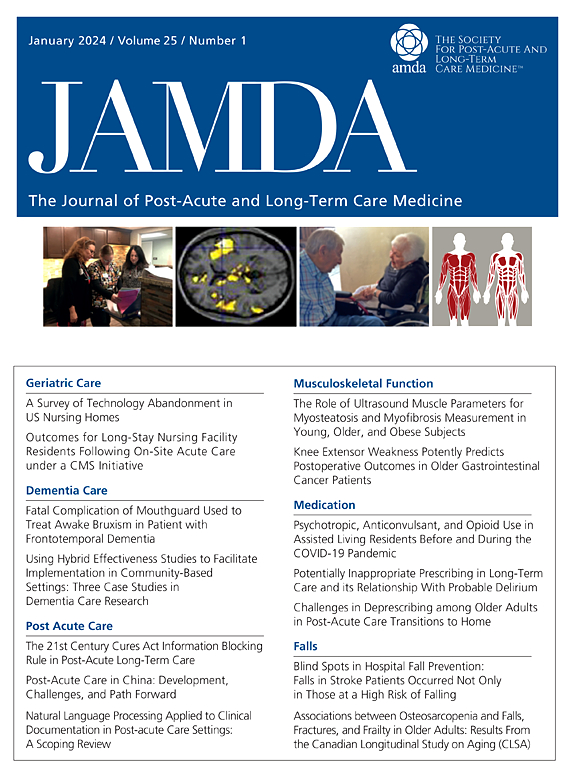家庭健康机构的质量对社会经济弱势社区患者的重要性。
IF 4.2
2区 医学
Q2 GERIATRICS & GERONTOLOGY
Journal of the American Medical Directors Association
Pub Date : 2025-02-01
DOI:10.1016/j.jamda.2024.105378
引用次数: 0
摘要
目的:探讨家庭保健患者社区社会经济地位在家庭保健机构(HHA)护理质量与健康结局之间的关系中的作用。设计:回顾性队列研究。环境和参与者:我们主要使用2019年结局和评估信息集数据,区域剥夺指数和患者护理质量星级评分。我们纳入了接受家庭保健的医疗保险受益人(≥65岁)。方法:采用线性概率回归模型对1,657,133名家庭保健患者的社区经济地位是否调节HHAs护理质量与健康结局之间的关系进行研究。结果:我们的研究结果表明,社会经济地位较低的社区的患者更有可能使用低质量的hha(租用弱势社区:11%,最弱势社区:15.2%)。我们的主要模型,经患者和ha水平特征调整后,显示患者生活在社会经济条件较差的社区(较少不利:系数:-0.017,P < .001;更不利:系数:-0.035,P < 0.001;最弱势:系数:-0.06,P < .001)和接受低质量hha护理(平均质量hha:系数:0.037,P < .001;高质量hha(系数:0.062,P < .001)在家庭保健期间留在社区的可能性较小。此外,我们的研究强调,当最弱势社区的患者使用低质量的hha时,他们在留在家中和社区时会遇到额外的挑战。结论和意义:这些发现强调了有针对性的干预措施和政策举措的必要性,旨在解决基于社区SES的护理质量差异。旨在提高卫生保健服务机构提供的护理质量和在社会经济条件不利的社区获得高质量卫生保健服务的努力,可能会对这些环境中个人的卫生公平和结果产生重大影响。本文章由计算机程序翻译,如有差异,请以英文原文为准。
The Importance of Quality of Home Health Agencies for Patients in Socioeconomically Disadvantaged Neighborhoods
Objectives
This study investigated the role of patients' neighborhood socioeconomic status (SES) on the relationship between home health agency (HHA) care quality and health outcomes among home health care patients.
Design
Retrospective cohort study.
Setting and Participants
We mainly used 2019 Outcome and Assessment Information Set data, Area Deprivation Index, and Quality of Patient Care Star Rating. We included Medicare beneficiaries (aged ≥ 65 years) who received home health care.
Methods
We used linear probability regression models to examine whether patients' neighborhood SES moderates the association between care quality of HHAs and health outcomes for 1,657,133 home health care patients.
Results
Our findings show that patients in neighborhoods with lower SES were more likely to use low-quality HHAs (lease disadvantaged neighborhoods: 11%, most disadvantaged neighborhoods: 15.2%). Our main model, adjusted by patient- and HHA-level characteristics, reveals patients living in socioeconomically disadvantaged neighborhoods (less disadvantaged: coefficient: −0.017, P < .001; more disadvantaged: coefficient: −0.035, P < .001; most disadvantaged: coefficient: −0.06, P < .001) and receiving care from low-quality HHAs (average-quality HHAs: coefficient: 0.037, P < .001; high-quality HHAs: coefficient: 0.062, P < .001) were less likely to remain in the community during their home health care. Furthermore, our study highlights that patients in the most disadvantaged neighborhoods encounter additional challenges in remaining at their homes and communities when they use low-quality HHAs.
Conclusions and Implications
These findings highlight the need for targeted interventions and policy initiatives aimed at addressing disparities in care quality based on neighborhood SES. Efforts directed at enhancing the quality of care provided by HHAs and access to high-quality HHAs in socioeconomically disadvantaged neighborhoods could substantially impact health equity and outcomes for individuals in these settings.
求助全文
通过发布文献求助,成功后即可免费获取论文全文。
去求助
来源期刊
CiteScore
11.10
自引率
6.60%
发文量
472
审稿时长
44 days
期刊介绍:
JAMDA, the official journal of AMDA - The Society for Post-Acute and Long-Term Care Medicine, is a leading peer-reviewed publication that offers practical information and research geared towards healthcare professionals in the post-acute and long-term care fields. It is also a valuable resource for policy-makers, organizational leaders, educators, and advocates.
The journal provides essential information for various healthcare professionals such as medical directors, attending physicians, nurses, consultant pharmacists, geriatric psychiatrists, nurse practitioners, physician assistants, physical and occupational therapists, social workers, and others involved in providing, overseeing, and promoting quality

 求助内容:
求助内容: 应助结果提醒方式:
应助结果提醒方式:


